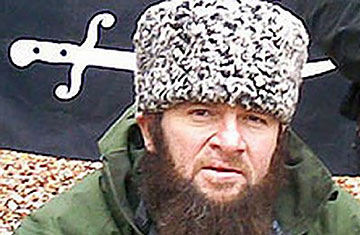
An undated photo of a man identified as Chechen separatist leader Doku Umarov
When Illyas Musayev heard that the Neva Express train had been bombed on Nov. 27, killing 26 well-to-do Russians and injuring about 100 others, the Chechen separatist was incredulous. He didn't want to believe that his former comrade in arms Doku Umarov had kept the pledge he made in August to bring his holy war out of the isolated Caucasus Mountains and into central Russia. But that is the picture that has emerged. On Wednesday, Umarov's Islamist group, the radical wing of the Chechen resistance, claimed responsibility for the attack on the train en route from Moscow to St. Petersburg. Now Musayev and experts agree that Russia, having ignored Umarov's stated intention in August to broaden his targets, faces the prospect of a nationwide insurgency.
"Yes, these attacks will most likely continue," Musayev, who served with Umarov in the independent Chechen government before it was crushed by the Russian army in 2000, tells TIME by phone from Copenhagen. Now living in Denmark, he is one of the leaders of Chechnya's civil resistance in exile, which maintains contact with the armed wing back home but denounces its tactics. "There are many young people there who are ready to do anything, who have lost parents during the [Chechen] wars, brothers, sisters, who have never gone to school, who have done nothing but train with Umarov and those around him. Under the cover of religion, of Islam, they will push these young people to commit these acts."
In the impoverished Russian regions of the North Caucasus, this would be nothing new. Centuries of Kremlin rule have failed to stamp out the Islamist resistance there, and suicide attacks and assassinations are not uncommon. Umarov, the self-appointed leader of the Caucasus emirate he proclaimed in 2007, is now waging a terrorist campaign to turn at least six regions into a new, independent state governed by radical Islamic law. Up to now, his methods have focused on localized guerrilla warfare, sending suicide bombers or gunmen to hit police targets or pick off officials from the Kremlin-backed regional governments.
But on Aug. 21, Umarov's organization — calling itself the Martyrs' Battalion Riyadus-Salikhiyn — announced a change of strategy. In a statement issued on the separatist website kavkazcenter.com, the group said it would no longer confine its battle to the heavily policed regions that it seeks to control. Russia's industrial centers, factories and infrastructure would become the targets. "To carry out these tasks, subversive groups were created and sent to a host of Russian regions with the aim of carrying out industrial sabotage. The priority targets laid out for them are gas pipelines, oil pipelines, the destruction of electricity stations and high-voltage power lines, and sabotage at factories," the statement read.
In practice, however, the new campaign does not appear to shy from hitting human targets too. On Aug. 17, in an attack that Umarov's battalion later claimed responsibility for, a truck packed with explosives rammed through the gates of a police station in the city of Nazran in the North Caucasus and detonated its payload, killing 25 policemen and injuring more than 150 others as they lined up for the morning head count. The group also took responsibility for a hydroelectric-dam accident that killed 75 people in Siberia on the same day. But the attack on the Neva Express, a luxury train from Moscow to St. Petersburg used by wealthy Russians and government officials, appears to be Umarov's first major operation in the Russian heartland.
"The tactic of moving away from his paramilitary structure and instead using small cells to strike at the structures of power — this is what Umarov is now carrying out," says Andrei Soldatov, a security expert and political commentator in Moscow. In other ways, too, the bomb laid on the tracks of the Neva Express bore the trademarks of Umarov's new approach. As rescue workers sifted through the wreckage, a second explosion at the scene of the bombing injured Russia's chief investigator in the Prosecutor General's office, Alexander Bastrykin, a close ally of Russian Prime Minister Vladimir Putin. "This tactic is used by terrorists in the North Caucasus," Bastrykin said in an interview published on Wednesday in the state-owned daily Rossiyskaya Gazeta. That bomb, investigators said, was triggered by a mobile phone, a method favored in the Caucasus. Putin, meanwhile, has called for tough measures against those behind the bombing. He said on a TV phone-in on Thursday that the attack showed that the threat to Russia from terrorism remained high. "It is necessary to act in a very tough way against criminals who carry out these kinds of terrorist attacks," said Putin, who went on to urge viewers to remain vigilant to the possibility of future attacks.
Analysts say it is still unclear how the Kremlin will react if bombings continue to hit closer to home. In 2002 the government's response to a deadly theater siege in Moscow — masterminded by one of Umarov's predecessors, Shamil Basayev — was to institute a brutal security regime in Chechnya and place restrictions on the media. The alleged human-rights abuses and repressions carried out by the Moscow-backed government in Chechnya are usually justified by reference to the threat of terrorism.
Nikolai Petrov, a political analyst at the Carnegie Center in Moscow, says that at this stage, the government is more likely to tighten security around Russia's infrastructure and other vulnerable targets. But if Umarov's terrorist campaign continues, the exiled Musayev fears a ruthless response from Putin's government. "This could play right into the Kremlin's hands," he says. "It could give them an excuse to retaliate against the regular citizens in Chechnya who sympathize with the resistance, to bring new troops there, to tighten the screws just as they've always done when our leaders take responsibility for these crimes."
